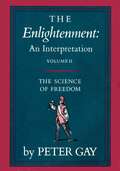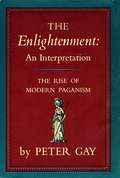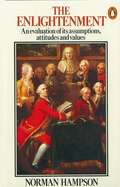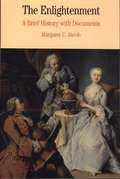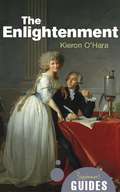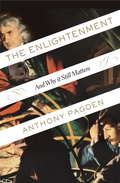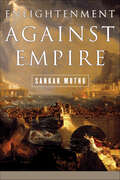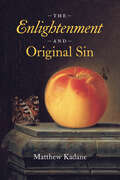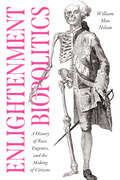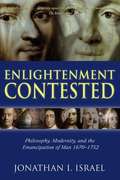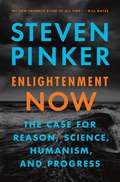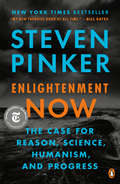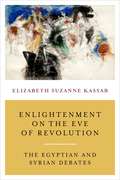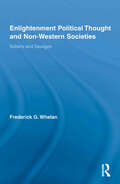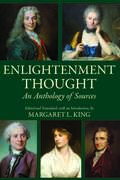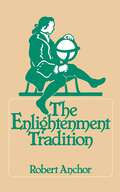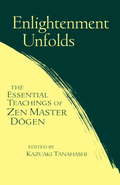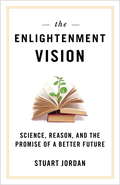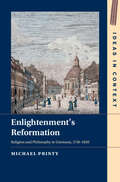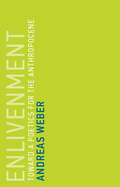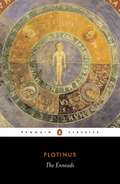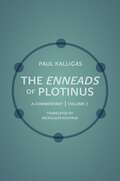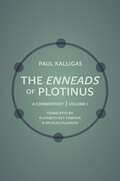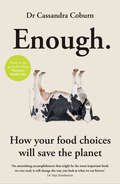- Table View
- List View
The Enlightenment: The Science of Freedom (Enlightenment: An Interpretation #2)
by Peter GayMr. Gay characterizes "The Recovery of Nerve" 18th century change of life to a safer more predictable lifestyle. In this book which is a social history of the Enlightenment, he describes the philosphes' environment, their view of progress, of science, of art, of society, and of politics.
The Enlightenment: An Interpretation - The Rise of Modern Paganism (Enlightenment: An Interpretation #1)
by Peter GayThe eighteenth-century Enlightenment marks the beginning of the modern age, when the scientific method and belief in reason and progress came to hold sway over the Western world. In the twentieth century, however, the Enlightenment has often been judged harshly for its apparently simplistic optimism. Now a master historian goes back to the sources to give a fully rounded account of its true accomplishments.<P><P> Winner of the National Book Award
The Enlightenment
by Norman HampsonArmed with the insights of the scientific revolution, the men of the Enlightenment set out to free mankind from its age-old cocoon of pessimism and superstition and establish a more reasonable world of experiment and progress. Yet by the 1760s, this optimism about man and society had almost evaporated. In the works of Rousseau, Kant and Goethe, there was discernible a new inner voice, and an awareness of individual uniqueness which had eluded their more self-confident predecessors. The stage was set for the revolutionary crisis and the rise of Romanticism. In this book, Norman Hampson follows through certain dominant themes in the Enlightenment, and describes the contemporary social and political climate, in which ideas could travel from the salons of Paris to the court of Catherine the Great - but less easily from a master to his servant. On such vexed issues as the role of ideas in the "rise of the middle class" he provides a new and realistic approach linking intellectual and social history.
The Enlightenment: A Brief History With Documents
by Margaret C. JacobIn an unusually diverse collection, Margaret Jacob presents the eighteenth-century movement known as the Enlightenment that forever changed the political, religious, and educational landscape of the day. Selections by some of the period's most important thinkers include pieces by Locke, Rousseau, Mary Wortley Montagu, Denis Diderot, and Moses Mendelssohn. She covers the movement's lengthy evolution in a comprehensive introduction, which establishes the issues central to understanding the documents and provides important background on the political and social debates of the period. All documents are preceded by headnotes, and the volume includes a chronology, 14 illustrations, a bibliography, and an index.
The Enlightenment: A Beginner's Guide (Beginner's Guides)
by Kieron O'HaraBlamed for the disasters of the 20th century: Auschwitz, globalisation, Islamic terrorism; heralded as the harbinger of reason, equality, and the end of arbitrary rule, the Enlightenment has been nothing if not divisive. To this day historians disagree over when, where, and what it was (and sometimes, still is). Kieron O'Hara brings to life the history, politics, science, religion, arts, and social life of the Enlightenment and shows how it spawned some of the brightest thinkers in the history of humankind, from the radical Rousseau to the conservative Burke. Dr Kieron O'Hara is a Senior Researcher at Southampton University, UK
The Enlightenment: And Why It Still Matters
by Anthony PagdenOne of our most renowned and brilliant historians takes a fresh look at the revolutionary intellectual movement that laid the foundation for the modern world. Liberty and equality. Human rights. Freedom of thought and expression. Belief in reason and progress. The value of scientific inquiry. These are just some of the ideas that were conceived and developed during the Enlightenment, and which changed forever the intellectual landscape of the Western world. Spanning hundreds of years of history, Anthony Pagden traces the origins of this seminal movement, showing how Enlightenment concepts directly influenced modern culture, making possible a secular, tolerant, and, above all, cosmopolitan world. Everyone can agree on its impact. But in the end, just what was Enlightenment? A cohesive philosophical project? A discrete time period in the life of the mind when the superstitions of the past were overthrown and reason and equality came to the fore? Or an open-ended intellectual process, a way of looking at the world and the human condition, that continued long after the eighteenth century ended? To address these questions, Pagden introduces us to some of the unforgettable characters who defined the Enlightenment, including David Hume, the Scottish skeptic who advanced the idea of a universal "science of man"; François-Marie Arouet, better known to the world as Voltaire, the acerbic novelist and social critic who challenged the authority of the Catholic Church; and Immanuel Kant, the reclusive German philosopher for whom the triumph of a cosmopolitan world represented the final stage in mankind's evolution. Comprehensive in his analysis of this heterogeneous group of scholars and their lasting impact on the world, Pagden argues that Enlightenment ideas go beyond the "empire of reason" to involve the full recognition of the emotional ties that bind all human beings together. The "human science" developed by these eminent thinkers led to a universalizing vision of humanity, a bid to dissolve the barriers past generations had attempted to erect between the different cultures of the world. A clear and compelling explanation of the philosophical underpinnings of the modern world, The Enlightenment is a scintillating portrait of a period, a critical moment in history, and a revolution in thought that continues to this day.Advance praise for The Enlightenment "The Enlightenment really does still matter, and with a combination of gripping storytelling about colorful characters and lucid explanation of profound ideas, Anthony Pagden shows why."--Steven Pinker, author of The Better Angels of Our Nature and The Blank Slate "Reading Anthony Pagden's The Enlightenment: And Why It Still Matters is an enlightenment in itself. The larger-than-life thinkers and talkers of eighteenth-century Europe have been blamed for everything from taking the magic out of life to making Auschwitz possible, but here, in sparkling style, Pagden shows us not only how their ideas made mankind modern but also what our world might have been like without them. Everyone interested in where the West came from should read this book."--Ian Morris, author of Why the West Rules--For Now "Anthony Pagden defends the Enlightenment as a cosmopolitan project with classical roots and contemporary relevance. Like Kant, he argues that we live in an age of enlightenment, ongoing but incomplete, but that someday we will experience a fully enlightened age. His lucid and learned book might help to realize that hope."--David Armitage, author of Foundations of Modern International Thought
Enlightenment against Empire
by Sankar MuthuIn the late eighteenth century, an array of European political thinkers attacked the very foundations of imperialism, arguing passionately that empire-building was not only unworkable, costly, and dangerous, but manifestly unjust. Enlightenment against Empire is the first book devoted to the anti-imperialist political philosophies of an age often regarded as affirming imperial ambitions. Sankar Muthu argues that thinkers such as Denis Diderot, Immanuel Kant, and Johann Gottfried Herder developed an understanding of humans as inherently cultural agents and therefore necessarily diverse. These thinkers rejected the conception of a culture-free "natural man." They held that moral judgments of superiority or inferiority could be made neither about entire peoples nor about many distinctive cultural institutions and practices. Muthu shows how such arguments enabled the era's anti-imperialists to defend the freedom of non-European peoples to order their own societies. In contrast to those who praise "the Enlightenment" as the triumph of a universal morality and critics who view it as an imperializing ideology that denigrated cultural pluralism, Muthu argues instead that eighteenth-century political thought included multiple Enlightenments. He reveals a distinctive and underappreciated strand of Enlightenment thinking that interweaves commitments to universal moral principles and incommensurable ways of life, and that links the concept of a shared human nature with the idea that humans are fundamentally diverse. Such an intellectual temperament, Muthu contends, can broaden our own perspectives about international justice and the relationship between human unity and diversity.
The Enlightenment and Original Sin (The Life of Ideas)
by Matthew KadaneAn eloquent microhistory that argues for the centrality of the doctrine of original sin to the Enlightenment. What was the Enlightenment? This question has been endlessly debated. In The Enlightenment and Original Sin, historian Matthew Kadane advances the bold claim that the Enlightenment is best defined through what it set out to accomplish, which was nothing short of rethinking the meaning of human nature. Kadane argues that this project centered around the doctrine of original sin and, ultimately, its rejection, signaling the radical notion that an inherently flawed nature can be overcome by human means. Kadane explores this and other wide-ranging themes through the story of a previously unknown figure, Pentecost Barker, an eighteenth-century purser and wine merchant. By examining Barker’s personal diary and extensive correspondence with a Unitarian minister, Kadane tracks the transformation of Barker’s consciousness from a Puritan to an Enlightenment outlook, revealing through one man’s journey the large-scale shifts in self-understanding whose philosophical reverberations have shaped debates on human nature for centuries.
Enlightenment and Revolution: The Making of Modern Greece
by Paschalis M. KitromilidesGreece sits at the center of a geopolitical storm that threatens the stability of the European Union. To comprehend how this small country precipitated such an outsized crisis, it is necessary to understand how Greece developed into a nation in the first place, Paschalis Kitromilides contends. "Enlightenment and Revolution" identifies the intellectual trends and ideological traditions that shaped a religiously defined community of Greek-speaking people into a modern nation-state--albeit one in which antiliberal forces have exacted a high price. Kitromilides takes in the vast sweep of the Greek Enlightenment in the eighteenth and nineteenth centuries, assessing key developments such as the translation of Voltaire, Locke, and other modern authors into Greek; the conflicts sparked by the Newtonian scientific revolution; the rediscovery of the civilization of classical Greece; and the emergence of a powerful countermovement. He highlights Greek thinkers such as Voulgaris and Korais, showing how these figures influenced and converged with currents of the Enlightenment in the rest of Europe. In reconstructing this history, Kitromilides demonstrates how the confrontation between Enlightenment ideas and Church-sanctioned ideologies shaped the culture of present-day Greece. When the Greek nation-state emerged from a decade-long revolutionary struggle against the Ottoman Empire in the early nineteenth century, the Enlightenment dream of a free Greek polity was soon overshadowed by a romanticized nationalist and authoritarian vision. The failure to create a modern liberal state at that decisive historic moment, Kitromilides insists, is at the root of Greeces recent troubles.
Enlightenment Biopolitics: A History of Race, Eugenics, and the Making of Citizens (The Life of Ideas)
by William Max NelsonA wide-ranging history tracing the birth of biopolitics in Enlightenment thought and its aftermath. In Enlightenment Biopolitics, historian William Max Nelson pursues the ambitious task of tracing the context in which biopolitical thought emerged and circulated. He locates that context in the Enlightenment when emancipatory ideals sat alongside the horrors of colonialism, slavery, and race-based discrimination. In fact, these did not just coexist, Nelson argues; they were actually mutually constitutive of Enlightenment ideals. In this book, Nelson focuses on Enlightenment-era visions of eugenics (including proposals to establish programs of selective breeding), forms of penal slavery, and spurious biological arguments about the supposed inferiority of particular groups. The Enlightenment, he shows, was rife with efforts to shape, harness, and “organize” the minds and especially the bodies of subjects and citizens. In his reading of the birth of biopolitics and its transformations, Nelson examines the shocking conceptual and practical connections between inclusion and exclusion, equality and inequality, rights and race, and the supposed “improvement of the human species” and practices of dehumanization.
Enlightenment Contested: Philosophy, Modernity, and the Emancipation of Man 1670-1752
by Jonathan I. IsraelJonathan Israel presents the first major reassessment of the Western Enlightenment for a generation. Continuing the story he began in the best-selling Radical Enlightenment , and now focusing his attention on the first half of the eighteenth century, he returns to the original sources to offer a groundbreaking new perspective on the nature and development of the most important currents in modern thought.
Enlightenment Now: The Case for Reason, Science, Humanism, and Progress
by Steven PinkerIs the world really falling apart? Is the ideal of progress obsolete? In this elegant assessment of the human condition in the third millennium, cognitive scientist and public intellectual Steven Pinker urges us to step back from the gory headlines and prophecies of doom, which play to our psychological biases. Instead, follow the data: In seventy-five jaw-dropping graphs, Pinker shows that life, health, prosperity, safety, peace, knowledge, and happiness are on the rise, not just in the West, but worldwide. This progress is not the result of some cosmic force. It is a gift of the Enlightenment: the conviction that reason and science can enhance human flourishing. Far from being a naïve hope, the Enlightenment, we now know, has worked. But more than ever, it needs a vigorous defense. The Enlightenment project swims against currents of human nature--tribalism, authoritarianism, demonization, magical thinking--which demagogues are all too willing to exploit. Many commentators, committed to political, religious, or romantic ideologies, fight a rearguard action against it. The result is a corrosive fatalism and a willingness to wreck the precious institutions of liberal democracy and global cooperation. With intellectual depth and literary flair, Enlightenment Now makes the case for reason, science, and humanism: the ideals we need to confront our problems and continue our progress.
Enlightenment Now: The Case for Reason, Science, Humanism, and Progress
by Steven Pinker<P> If you think the world is coming to an end, think again. Steven Pinker presents the big picture of human progress: people are living longer, healthier, freer, and happier lives, and while our problems are formidable, the solutions lie in the Enlightenment ideal of using reason and science.Is the world really falling apart? Is the ideal of progress obsolete? <P> In this elegant assessment of the human condition in the third millennium, cognitive scientist and public intellectual Steven Pinker urges us to step back from the gory headlines and prophecies of doom, which play to our psychological biases. <P>Instead, follow the data: In seventy-five jaw-dropping graphs, Pinker shows that life, health, prosperity, safety, peace, knowledge, and happiness are on the rise, not just in the West, but worldwide. This progress is not the result of some cosmic force. It is a gift of the Enlightenment: the conviction that reason and science can enhance human flourishing.Far from being a naïve hope, the Enlightenment, we now know, has worked. But more than ever, it needs a vigorous defense. <P>The Enlightenment project swims against currents of human nature--tribalism, authoritarianism, demonization, magical thinking--which demagogues are all too willing to exploit. Many commentators, committed to political, religious, or romantic ideologies, fight a rearguard action against it. The result is a corrosive fatalism and a willingness to wreck the precious institutions of liberal democracy and global cooperation. With intellectual depth and literary flair, Enlightenment Now makes the case for reason, science, and humanism: the ideals we need to confront our problems and continue our progress. <P><b>A New York Times Bestseller</b>
Enlightenment on the Eve of Revolution: The Egyptian and Syrian Debates
by Elizabeth Suzanne KassabDuring the two decades that preceded the 2011 revolutions in Egypt and Syria, animated debates took place in Cairo and Damascus on political and social goals for the future. Egyptian and Syrian intellectuals argued over the meaning of tanwir, Arabic for “enlightenment,” and its significance for contemporary politics. They took up questions of human dignity, liberty, reason, tolerance, civil society, democracy, and violence. In Enlightenment on the Eve of Revolution, Elizabeth Suzanne Kassab offers a groundbreaking analysis of the tanwir debates and their import for the 2011 uprisings.Kassab locates these debates in their local context as well as in broader contemporary political and intellectual Arab history. She argues that the enlightenment they advocated was a form of political humanism that demanded the right of free and public use of reason. By calling for the restoration of human dignity and seeking a moral compass in the wake of the destruction wrought by brutal regimes, they understood tanwir as a humanist ideal. Kassab connects their debates to the Arab uprisings, arguing that their demands bear a striking resemblance to what was voiced on the streets of Egypt and Syria in 2011. Enlightenment on the Eve of Revolution is the first book to document these debates for the Anglophone audience and to analyze their importance for contemporary Egyptian and Syrian intellectual life and politics.
Enlightenment Political Thought and Non-Western Societies: Sultans and Savages (Routledge Studies in Social and Political Thought)
by Frederick G. WhelanFrederick G. Whelan, a leading scholar of Enlightenment political thought, provides an illuminating and incisive interpretation of key eighteenth and nineteenth century European political thinkers' accounts and assessments of the societies and political institutes of the non-Western world. These writers opened up a major new comparative dimension for political theory and its project both to explain and evaluate different political regimes. While the intellectual confrontation of European thinkers with alien cultures tended on the whole to confirm Westerners' sense of the superiority of their own institutions, it was also characterized – during the Enlightenment more so than later – by convictions regarding a common humanity and a corresponding sympathetic curiosity about different ways of life, however primitive or exotic they might appear. This book will be of interest to students and scholars of both political philosophy and thought as well as historians of this important period of history.
Enlightenment Thought: An Anthology of Sources
by Margaret L. King"Margaret L. King has put together a highly representative selection of readings from most of the more significant—but by no means the most obvious—texts by the authors who made up the movement we have come to call the 'Enlightenment.' They range across much of Europe and the Americas, and from the early seventeenth century until the end of the eighteenth. In the originality of the choice of texts, in its range and depth, this collection offers both wide coverage and striking insights into the intellectual transformation which has done more than any other to shape the world in which we live today. It is simply the best introduction to the subject now available." —Anthony Pagden, UCLA, and author of The Enlightenment and Why It Still Matters Contents:Chronology, IntroductionChapter One - Casting Out Idols: 1620–1697Idols, or false notions: Francis Bacon, The New Instrument (1620)I think, therefore I am: René Descartes, Discourse on Method (1637)God, or Nature: Baruch Spinoza, Ethics (1677)The system of the world: Isaac Newton, Mathematical Principles of Natural Philosophy (1687)He searched for truth throughout his life: Pierre Bayle, Historical and Critical Dictionary (1697)Chapter Two - The Learned Maid: 1638–1740A face raised toward heaven: Anna Maria van Schurman, Whether the Study of Letters Befits a Christian Woman (1638)The worlds I have made: Margaret Cavendish, The Blazing World (1666)A finer sort of cattle: Bathsua Makin, An Essay to Revive the Ancient Education of Gentlewomen (1673)I warn you of the world: Madame de Maintenon, Letter: On the Education of the Demoiselles of Saint-Cyr (August 1, 1686), and Instruction: On the World (1707)The daybreak of your reason: Émilie Du Châtelet, Fundamentals of Physics (1740)Chapter Three - A State of Perfect Freedom: 1689–1695The chief criterion of the True Church: John Locke, Letter on Toleration (1689)Freedom from any superior power on earth: John Locke, Second Treatise on Civil Government (1689)A white paper, with nothing written on it: John Locke, Essay Concerning Human Understanding (1689)Let your rules be as few as possible: John Locke, Some Thoughts Concerning Education (1693)From death, Jesus Christ restores all to life: John Locke, The Reasonableness of Christianity, as Delivered in the Scriptures (1695)Chapter Four - All Things Made New: 1725–1784In the wilderness, they are reborn: Giambattista Vico, The New Science (1725/1730/1744)Without these Names, nothing can be known, Carl Linnaeus, System of Nature (1735)All the clouds at last are lifted: Anne Robert Jacques Turgot, The Successive Advancement of the Human Mind (1750)A genealogical or encyclopedic tree of knowledge: Jean le Rond d’Alembert, Preliminary Discourse (1751)Dare to know! : Immanuel Kant, What Is Enlightenment? (1784)Chapter Five - Mind, Soul, and God: 1740–1779The narrow limits of human understanding: David Hume, An Abstract of a Book Lately Published (1740)The soul is but an empty word: Julien Offray de La Mettrie, Man a Machine (1747)All is reduced to sensation: Claude Adrien Helvétius, On the Mind (1758)An endless web of fantasies and falsehoods: Paul-Henri Thiry, baron d’Holbach, Common Sense (1772)Let each believe that his own ring is real: Gotthold Ephraim Lessing, Nathan the Wise (1779)Chapter Six - Crush That Infamous Thing: 1733–1764This is the country of sects: Voltaire, Philosophical Letters (1733)Disfigured by myth, until enlightenment comes: Voltaire, The Culture and Spirit of Nations (1756)The best of all possible worlds: Voltaire, Candide (1759)Are we not all children of the same God?: Voltaire, Treatise on Tolerance (1763)If a book displeases you, refute it! : Voltaire, Philosophical Dictionary (1764)Chapter Seven - Toward the Greater Good: 1748–1776Things must be so ordered that power checks power, Charles de Secondat, baron de Montesquieu, The Spirit of the Laws (1748)Complete freedom of trade must be ensured: François Quesnay, General Maxims for the Economic Management of an Agricultural Kingdom (1758)The nation's war against the citizen: Cesare Beccaria, On Crimes and Punish
The Enlightenment Tradition
by Robert AnchorThis synoptic survey examines critically the origins, development, decline, and historical significance of the European Enlightenment. The underlying theme of the inquiry is the real and possible relevance of the Enlightenment tradition to contemporary Western society.
Enlightenment Unfolds
by Kazuaki TanahashiEnlightenment Unfolds is a sequel to Kaz Tanahashi's previous collection, Moon in a Dewdrop, which has become a primary source on Dogen for Western Zen students. Dogen Zenji (1200-1253) is unquestionably the most significant religious figure in Japanese history. Founder of the Soto school of Zen (which emphasizes the practice of zazen or sitting meditation), he was a prolific writer whose works have remained popular for six hundred years. Enlightenment Unfolds presents even more of the incisive and inspiring writings of this seminal figure, focusing on essays from his great life work, Treasury of the True Dharma Eye, as well as poems, talks, and correspondence, much of which appears here in English for the first time.Tanahashi has brought together his own translations of Dogen with those of some of the most respected Zen teachers and writers of our own day, including Reb Anderson, Edward Espe Brown, Norman Fisher, Gil Fronsdal, Blanche Hartman, Jane Hirschfield, Daniel Leighton, Alan Senauke, Katherine Thanas, Mel Weitzman, and Michael Wenger.
The Enlightenment Vision
by Stuart JordanIn the seventeenth and eighteenth centuries, a major cultural shift took place in western Europe. Leading thinkers began to emphasize the use of reason to tackle the challenges of material and social life, and they questioned the tenets of Christianity concerning the existence of God, the purpose of life, and the needs of the individual. Instead of religion, intellectuals put their faith in science and humanistic ethics in the hope of improving the secular lives of people everywhere. Today we call this development the Enlightenment. Contemporary society is the principal beneficiary of Enlightenment discoveries. This thought-provoking analysis evaluates the progress that global society has made since the Enlightenment. The author begins by pointing out features of present-day society that are the direct descendants of the Enlightenment's discoveries and advances: our technology, modern medicine, science-based worldview, democratic political institutions, and concepts of human rights are all an outgrowth of the pioneering efforts of Enlightenment reformers. But along with these benefits, the author notes that we are also the inheritors of some significant problems produced in the wake of these advances; overpopulation, nuclear proliferation, and global climate change are just some of the recent developments that seem to threaten the whole Enlightenment project. Other great concerns include the continuing economic disparity between prosperous and impoverished nations, the persistence of widespread ignorance, and destructive reactionary forces bent on provoking new conflicts. Despite these and other daunting challenges of the twenty-first century, the author concludes on a cautiously optimistic note, predicting that the Enlightenment vision of prosperity, security, justice, and good health for all will eventually be achieved.
Enlightenment's Reformation: Religion and Philosophy in Germany, 1750–1830 (Ideas in Context)
by Michael PrintyHow did we get from the religious core of the sixteenth-century Reformation to the notions of freedom popularised by Hegel and Ranke? Enlightenment's Reformation explores how two key cultural and intellectual achievements – the sixteenth-century Reformation and the late eighteenth-century birth of 'German' philosophy – became fused in public discussion over the course of the 'long' eighteenth century. Michael Printy argues that Protestant theologians and intellectuals recast the meaning of Protestantism as part of a wide-ranging cultural apology aimed at the twin threats of unbelief and deism on the one hand, and against Pietism and a nascent evangelical awakening on the other. The reimagining of the Reformation into a narrative of progress was powerful, becoming part of mainstream German intellectual culture in the early decades of the nineteenth century. Utilising Reformation history, Enlightenment history, and German philosophy, this book explores how the rich if unstable idea linking Protestantism and modern freedom came to dominate German intellectual culture until the First World War.
Enlivenment: Toward a Poetics for the Anthropocene (Untimely Meditations #16)
by Andreas WeberA new understanding of the Anthropocene that is based on mutual transformation with nature rather than control over nature. We have been told that we are living in the Anthropocene, a geological era shaped by humans rather than by nature. In Enlivenment, German philosopher Andreas Weber presents an alternative understanding of our relationship with nature, arguing not that humans control nature but that humans and nature exist in a commons of mutual transformation. There is no nature–human dualism, he contends, because the fundamental dimension of existence is shared in what he calls "aliveness." All subjectivity is intersubjectivity. Self is self-through-other. Seeing all beings in a common household of matter, desire, and imagination, an economy of metabolic and economic transformation, is “enlivenment.” This perspective allows us to move beyond Enlightenment-style thinking that strips material reality of any subjectivity.To take this step, Weber argues, we need to supplant the concept of techné with the concept of poiesis as the element that brings forth reality. In a world not divided into things and ideas, culture and nature, reality arises from the creation of relationships and continuous fertile transformations; any thinking in terms of relationships comes about as a poetics. The self is always a function of the whole; the whole is equally a function of the individual. Only this integrated freedom allows humanity to reconcile with the natural world.This first English edition of Enlivenment has been expanded and updated from the German edition.
The Enneads: Psychic And Physical Treatises, Comprising The Second And Third Enneads
by PlotinusRegarded as the founder of Neo-Platonism, Plotinus (AD 204-70) was the last great philosopher of antiquity, producing 0works that proved in many ways a precursor to Renaissance thought. Plotinus was convinced of the existence of a state of supreme perfection and argued powerfully that it was necessary to guide the human soul towards this state. Here he outlines his compelling belief in three increasingly perfect levels of existence - the Soul, the Intellect, and the One - and explains his conviction that humanity must strive to draw the soul towards spiritual transcendence. A fusion of Platonism, mystic passion and Aristotelian thought, The Enneads offers a highly original synthesis of early philosophical and religious beliefs, which powerfully influenced later Christian and Islamic theology.
The Enneads of Plotinus: A Commentary | Volume 2
by Paul KalligasThe second volume in a landmark commentary on an important and influential work of ancient philosophyThis is the second volume of a groundbreaking commentary on one of the most important works of ancient philosophy, the Enneads of Plotinus—a text that formed the basis of Neoplatonism and had a deep influence on early Christian thought and medieval and Renaissance philosophy. This volume covers Enneads IV and V, which focus on two of the principal “hypostases” of Plotinus’s ontological system, namely the soul and the Intellect. Paul Kalligas provides an analytical exegesis of the arguments, along with an account of Plotinus’s principal sources, references to other parts of his work, and a systematic evaluation of his overarching theoretical aspirations. A landmark contribution to Plotinus scholarship, this is the most detailed and extensive commentary ever written for the whole of the Enneads.
The Enneads of Plotinus, Volume 1: A Commentary
by Paul KalligasThe first volume in a landmark commentary on an important and influential work of ancient philosophyThis is the first volume of a groundbreaking commentary on one of the most important works of ancient philosophy, the Enneads of Plotinus—a text that formed the basis of Neoplatonism and had a deep influence on early Christian thought and medieval and Renaissance philosophy. This volume covers the first three of the six Enneads, as well as Porphyry's Life of Plotinus, a document in which Plotinus’s student—the collector and arranger of the Enneads—introduces the philosopher and his work. A landmark contribution to modern Plotinus scholarship, Paul Kalligas’s commentary is the most detailed and extensive ever written for the whole of the Enneads.For each of the treatises in the first three Enneads, Kalligas provides a brief introduction that presents the philosophical background against which Plotinus’s contribution can be assessed; a synopsis giving the main lines and the articulation of the argument; and a running commentary placing Plotinus’s thought in its intellectual context and making evident the systematic association of its various parts with each other.
Enough: How your food choices will save the planet
by Dr Cassandra Coburn***'An astonishing accomplishment that might be the most important book we ever read, it will change the way you look at what we eat forever.' - Dr Max Pemberton'A wonderfully written guide for anyone who wants to eat better and save the world at the same time. Essential reading for anyone who cares about the planet.' - Thomasina MiersHow changing what you eat can save the planetOur food production systems are the single biggest cause of environmental change, while diseases linked to our eating habits are at epidemic levels and increasing. Enough. uses the latest scientific research to address this vital question: can we provide a growing population with a healthy diet from sustainable food systems? Fortunately for us all, the answer is yes. Enough. shows exactly how we can tackle both of these urgent, interconnected challenges at the same time. Using a seminal piece of research published in 2019, the Planetary HealthDiet (PHD), Dr Coburn reveals the hidden consequences of our food choices, and how we can easily make changes which are better for ourselves and the planet. She details which food groups we should be eating, which we should avoid - and why. Changing our way of eating is something that every one of us has the power to do. Enough. is a clear, ultimately hopeful and hugely important roadmap for both own health - and the planet's.
